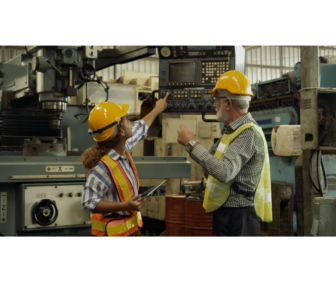The key to having an economy ![]() with rising household incomes for all are good-paying jobs and careers. Where careers are for forty years, not a first job. The prime focus of economic policy must be helping people have a career of good-paying work.
with rising household incomes for all are good-paying jobs and careers. Where careers are for forty years, not a first job. The prime focus of economic policy must be helping people have a career of good-paying work.
Also understanding that good-paying work today and, even more so, tomorrow looks much different than good-paying work in the past. Trying to turn the clock back to recreate the economy of the past has not worked. Both parties in Michigan have been promising they can do that for decades without success.
Trying to turn the clock back won’t succeed in the future either. The changes in the nature of work are driven by powerful forces––primarily smarter and smarter machines increasingly able to do more and more of the work that humans have traditionally done. But also globalization, changing consumer preferences, and changes in how employers contract for work. This requires state policies that are aligned with––rather than resisting––the new realities of work.
There are five big ongoing changes in the nature of work:
- Jobs are increasingly service-providing not goods-producing. Goods-producing is primarily work in farming, mining, manufacturing and construction. Now about 20 percent of American employment and continuously declining as a share of national employment. The likely transformation of the auto industry from primarily selling cars to providing mobility will change Michigan’s most important industry from mainly goods-producing to mainly service-providing.
- Good-paying work is increasingly going to professionals and managers who work in offices, schools and hospitals. It includes the pre- and post-production work of the auto industry and other manufacturing enterprises (engineering, design, logistics, marketing, management, etc.) Yes there are good-paying jobs that do not require a four-year degree. And certainly there are good-paying jobs not done in offices, schools and hospitals. But good-paying work with good benefits is increasingly going to those with a four-year degrees or more and is increasingly concentrated in knowledge-based services.
- Smarter and smarter machines are accelerating the creative destruction of jobs, occupations and even industries. But which jobs, occupations and industries will be most affected and when is unpredictable. So your job and occupation today are less secure than yesterday and will be even less secure tomorrow than today.
- Because of smarter and smarter machines, work is increasingly right brain––the skills that are the hardest to automate. Daniel Pink in his book A Whole New Mind posits that new good-paying jobs increasingly will go to people who are creators, empathizers, pattern recognizers and meaning makers.
- Work is increasingly contingent: more and more jobs will go from stable and life-long––predominantly full time with benefits from an employer––to unstable, occasional, part-time, flex jobs––with far more of us working for ourself where we are responsible for our employment, salary and benefits.
We want to be clear that this description of the changes in the demand for goods-producing and service-providing occupations is not a value judgment on our part. If we had been writing this report at the turn from the 19th to the 20th Century we would have written that the demand for farmers was declining and the demand for factory workers increasing. Then and now we think that farming is an honorable profession. But the trends were clear then that we were going to need far fewer farmers and far more factory workers.
The same is true today. Working in factories and other goods-producing industries is honorable work. And we value those who do those jobs. We need a far better system for helping prepare people who want to work in those occupations and industries. But the reality is that the economy is demanding a smaller and smaller proportion of workers in those occupations and industries.
Another reality is that there is a lot of work that is not good paying. Maybe as much as half the jobs in the Michigan economy today don’t pay enough in wages and benefits to pay for family necessities as defined by the Michigan Association of United Ways. There is no evidence that the proportion of low-paid work, most without benefits, is going to decline going forward.
We are living in a world where the gales of creative destruction blow stronger and faster. In an economy increasingly characterized by rapid and discontinuous change, successful individuals, enterprises, and communities will need to be agile: able to let go of what is no longer working and embrace—or better yet, create—the next wave.
This, of course, is the role Michigan played at the beginning of the Industrial Age. Because we embraced the new—and left behind the old—quicker than anyone else, we became one of the leading-edge communities in the world for most of the Twentieth Century.
We were both the place where entrepreneurs led by Henry Ford invented the next economy and also the place where many people migrated across the landscape and went to a city and/or took a totally different kind of job in the rising factory-based mass middle class. By and large Michiganders who took the risk of leaving the declining farm economy for the rising factory economy did the best.
Once again, success is tied to letting go of the old and embracing the new. Michigan needs to get on a new path if we are to succeed in the knowledge-driven and entrepreneurial economy of the future.
We are not naive. We know that, just as in the Industrial Age, not all of us will be economic winners. We understand that for many Michiganders the transition to a new economy means a reduction in their standard of living. Some will lose their job. Others, who keep their job, will see their wages reduced. Some who lose their job will have a hard time finding a new job, and many will only find new jobs that pay less. A lot of us will have our employer provided health care reduced or eliminated. Most of us will have less job security.
But the mega forces that are transforming the economy trump policy and politics. Rather than pursue a policy agenda that tries to make the old economy work for us again––which has not succeeded the past fifteen years and cannot succeed in the future––in our new report, A Path to Good-paying Careers for all Michiganders, we recommend a state policy agenda designed to help all Michiganders succeed in the economy of today and tomorrow.







